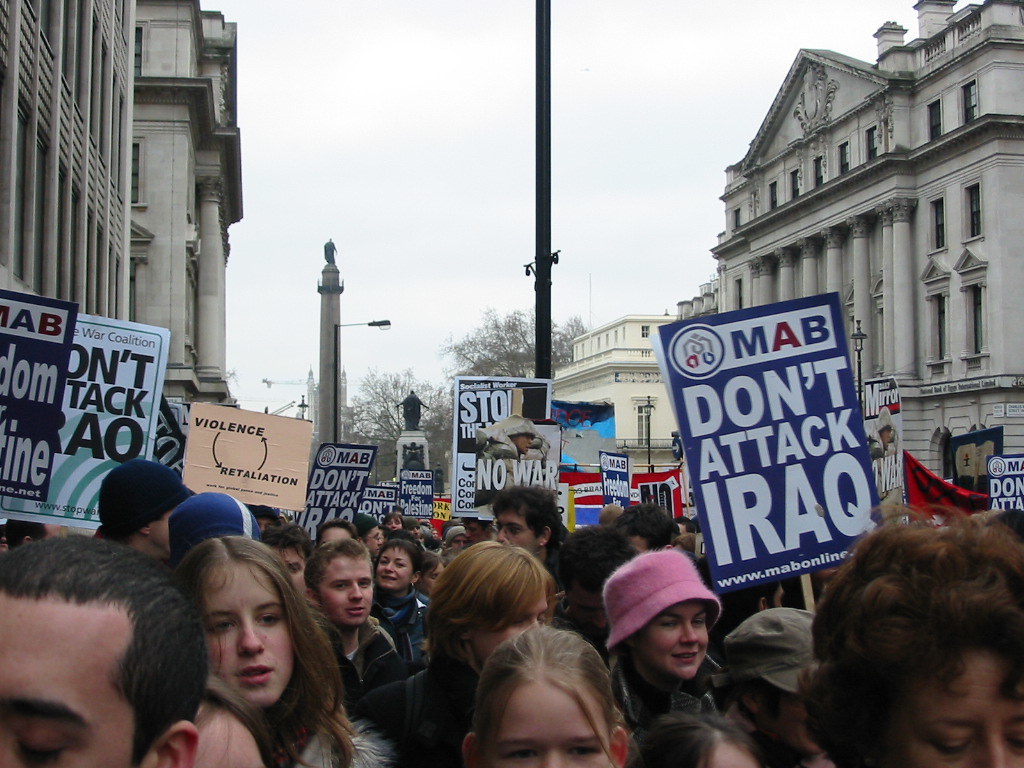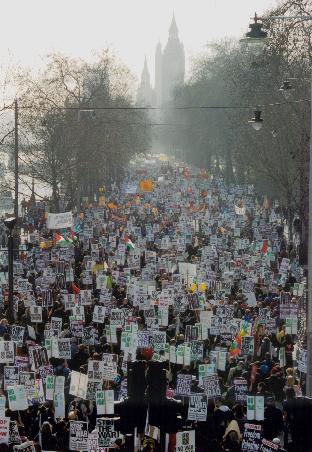By Professor Catriona Pennell
‘History may remember him…’
– Statement from the Rumsfeld family, 30 June 2021.
Former US Defence Secretary, Donald Rumsfeld, died on 29 June 2021 at the age of 88. His name will forever be associated with the 2003 invasion of Iraq. Various ‘obitu-mmentaries’ have appeared since his death from across the political spectrum. Former President George W. Bush lamented the loss of ‘a faithful steward of [America’s] armed forces’; American right-wing online magazine The Federalist described him as ‘a genius’ and ‘true American patriot’; many more chastised his poor-decision making as defence secretary, his efforts to cover up inconvenient facts, and his role in the widespread use of torture that has dogged America’s reputation ever since.
A divisive figure – hero to some, a villain to many – this seems a fair assessment of the varying news opinion of the past five days. Yet while consensus has not been reached on his reputation, the media – along with those closest to him – have no doubt that he will be remembered.
Yet as Rodney Harrison articulates, the process of forgetting is integral to remembering; we cannot form new memories and attach meaning to them without choosing to discard others. With cultivation must come pruning otherwise ‘we hazard becoming overwhelmed by memory’.[1] While Rumsfeld’s family can be confident that their memory of the patriarch will be kept alive by those who loved him the most, on the broader canvas of history, Rumsfeld may be remembered in a more critical light.
The 2003 invasion of Iraq is undoubtedly one of the most significant events of the early 21st century. But as Jack McDonald, Lecturer in War Studies at King’s College London, recently observed those of us in Higher Education are now teaching students who were born after the 2003 invasion, prompting the question: has the invasion now faded into history?
‘Sierra Leone and the 2003 invasion of Iraq are now in one way functionally equivalent to the First World War – it happened before they were born.’
– Jack McDonald, 8 June 2021.
From an IR/conflict studies perspective, we need to consider the fact that our students are unfamiliar with what we conceive as ‘conventional warfare’. To follow McDonald’s argument, recent British military intervention has been targeted as a series of indeterminate conflicts ‘that wax and wane without an apparent end point’ (McDonald, 2021). Perceived as a deviation from traditional warfare, conflicts are now fought without clearly determined objectives and targets, thus complicating understandings of ‘victory’ and ‘failure’. The fall of Saddam Hussein was the beginning – not the end – of a complex, messy, and ongoing altercation, marking a moment of transformation in warfare.

Conversely, this discussion of ‘conventional warfare’ and comparison across time also sparks interesting debates about the degree of ‘unconventionality’ in traditionally assumed ‘conventional’ wars. Recent scholarship in First World War Studies highlights the restrictive nature of the assumed 1914-1918 timeline, instead calling for greater temporal and geographical breadth and an awareness of the degree to which the First World War was an amass of regional conflicts that continued well into the 1920s and beyond, whether as civil war, inter-state conflict, revolution, or insurgency.[2] Other scholars have argued that because there were no ‘definable objectives’ in 1914, the war rapidly took on global proportions and continued for four and half years despite mounting bloodshed and destruction. Total war could only end with total victory or total defeat.[3]
From a socio-cultural historical perspective, the issue of 2003 as ‘history’ raises the question: to what extent is the death of Donald Rumsfeld the beginning of what culminated in First World War Studies as ‘the Harry Patch’ phenomenon? In other words, as one of the older members of ‘generation 2003’, does Rumsfeld’s death indicate the start of the process of the invasion of Iraq in 2003 shifting from living memory to cultural memory? And what does that mean for those of us who research and teach on this topic?
At a crude level, it means that we should reassess our inbuilt assumptions about what our students will understand and recognise without contextual intervention. It raises the issue of ‘flashbulb memories’ – detailed and vivid memories for learning the news of certain prominent public events, coined by two researchers, Roger Brown and James Kulik, in the 1970s.[4] Considering my own ‘flashbulb memories’ begin with the fall of the Berlin Wall in November 1989 and the release of Nelson Mandela from prison in February 1990, this is something we constantly have to reassess in the course of our teaching as ‘we’ get older and, well, our students get younger.
But it also raises questions about where the 2003 invasion of Iraq fits into these discussions. To what degree was the war, and its build-up, a ‘flashbulb moment’? I can vividly remember standing at the gates of Hyde Park on 15 February 2003 as we reached the end of the anti-war protest in London; it had taken us so long to reach this point, from our start at Embankment, that I could only assume it was due to police blockages. I rang my Dad to see what was going on; I can still hear his voice shouting in elation – ‘one and a half million, Trini! They’re saying one and a half million!’ – and tears rolled down my face. I was really part of something; a part of history. And then, just over a month later, that hope being replaced by abject despair and bewilderment as I stayed up all night watching, via the TV in the comfort of my living room, the bombs fall on Baghdad, only imagining how that was being experienced by Iraqi citizens themselves.

As we approach the 20th anniversary of the outbreak of the war in Iraq – and its surrounding controversies – the time is ripe to start collecting, recording, and mapping these memories in a methodical and accessible format, so that this ‘history’ – at least for our students, and future students – is preserved for ongoing analysis and reflection. Whether you think he was a radical warmonger or the liberator of Afghanistan (or something else entirely), at least Donald Rumsfeld is useful in reminding us of the value of capturing time before it has passed.
[1] Rodney Harrison, ‘Forgetting to remember, remembering to forget: late modern heritage practices, sustainability and the “crisis” of accumulation of the past’, International Journal of Heritage Studies 19:6 (2013), pp. 579-95.
[2] Robert Gerwarth and Erez Manela, ‘The Great War as a Global War: Imperial Conflict and the Reconfiguration of World Order, 1911-1923’, Diplomatic History 38:4 (2014), pp. 786-800.
[3] Hew Strachan, The First World War, Volume One: To Arms (Oxford: Oxford University Press, 2001).
[4] Martin A. Conway, Flashbulb Memories (Hove: Lawrence Erlbaum Associates Ltd, 1995), p. 1.